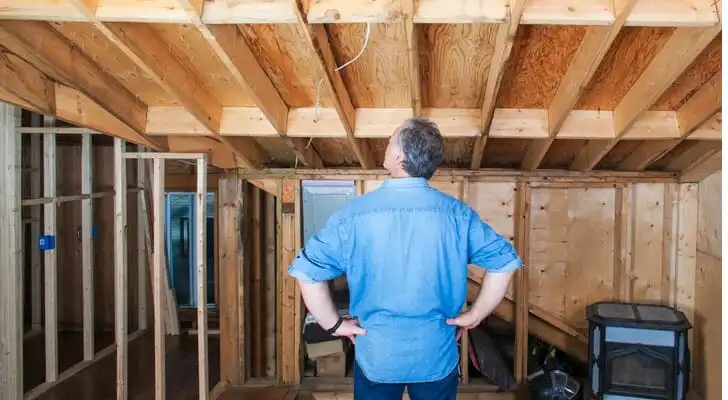

For a Federal Housing Administration (FHA) loan to be approved, the home must pass an FHA inspection and appraisal. That means it must be worth the purchase price and have such basics as electricity, drinkable water, adequate heat, a stable roof, fire exits and more. This guide will provide an FHA inspection checklist and walk you through the whole process, so you know what to expect. If you’re preparing for the other major financial decisions in your life, a financial advisor can be helpful.
Typically, a mortgage lender requires an appraisal of the true value of the home to be purchased. This is to make sure the home is worth the selling price. For an FHA loan, the U.S. Department of Housing and Urban Development (HUD) requires this, plus an inspection of the home’s condition. In order to pass inspection, the home must meet minimum safety, security and soundness standards.
An FHA inspection is conducted by a licensed, HUD-approved property appraiser. Generally speaking, the home must reasonably protect the safety and health of its occupants and adequately support the protection of their property. In addition, its structural integrity can’t be in danger of being compromised.
The inspector determines whether the property meets these standards and reports it on an FHA form. For detached single-family homes, the inspector uses the Uniform Residential Appraisal report. Here, the inspector also lists whether any particular issues must be remedied before the HUD can approve the loan.
As far as appraising the home’s value goes, the HUD-approved inspector will do what’s normally done. He’ll compare the house to similar property that sold recently in the area. But keep in mind health and safety concerns are the most important part of the process here as far as the FHA and HUD are concerned.
Once this process is complete, the inspector sends a form to the lender for further evaluation. And once the lender gives its approval, the FHA loan moves forward. However, if the inspector finds problems, they need to be addressed before the bank can approve the loan. So knowing what the inspector looks for will help expedite the loan process.

An FHA appraiser goes through the house while documenting its structure and other key details such as its layout. He’ll also keep an eye out for particular hazards that must be taken care of before an FHA loan will be approved on the property. We describe some of these below:
The roof must be sturdy enough to reasonably last two to three years and it must keep moisture out. In addition, the roof can’t have more than three layers. If it does and the appraiser finds enough damage, they would require a new roof.
The overall structure of the property must be in good enough condition to keep its occupants safe. This means severe structural damage, leakage, dampness, decay or termite damage can cause the property to fail inspection. In such a case, repairs must be made in order for the FHA loan to move forward.
Each inhabitable room must have an adequate heating source. However, certain exceptions apply in areas that experience mild winters. In addition, the water heater must adhere to local building codes. Furthermore, electric boxes can’t have damaged or exposed wires.
An appraiser would inspect the property for potential safety hazards such as asbestos. In the event that the inspector finds asbestos that may be damaged, an asbestos expert must conduct another examination. Some hazards are not obvious such as contaminated soil.
The property may not pass inspection if it sits in an area that’s too noisy or within proximity to a hazardous waste site, as defined by the federal government. We list a few area-specific nuisances that may prevent a home from passing FHA inspection:
To pass inspection, the home must provide access to pedestrians and vehicles, particularly emergency vehicles. These must be able to access the home under all weather conditions.
This is an overview of what issues an FHA inspector looks for. For a complete guide, access the Department of Housing and Urban Development’s Homeownership Center (HOC) Reference Guide.
FHA safety requirements may seem excessive. But keep in mind many of these issues can be solved. In addition, the FHA doesn’t place too much emphasis on minor cosmetic defects, delayed maintenance and normal wear-and-tear. As long as it’s not reasonably detrimental to safety, security and soundness, it will likely pass inspection. We provide a list of such cases below:
The first step to take if a home doesn’t pass inspection is to figure out why. It’s most likely something that can be rectified. Maybe the seller needs to repair something with the heating or electrical system. If extensive, the seller may want to raise the purchase price in order to cover needed repairs.
But if a structure failed inspection due to serious damage, it may be best for all concerned for the homeowner to sell to a buyer who is not getting FHA financing. If you’re the buyer, you’ll have to continue house hunting. Or perhaps, you want to take a step back and repair your credit score before continuing the search, so that you can qualify for a conventional mortgage. This will also help you secure a favorable mortgage rate.

A HUD-approved appraiser conducts an FHA inspection to make sure the property is safe, secure and sturdy enough to live in. The requirements are baseline safety issues, though. To protect your investment in a more certain capacity, you’ll want to get a separate home inspection and make the sales contract contingent on the results. If the home does not pass the FHA inspection, and the seller does not want to make the needed repairs, the prospective buyer should move on and continue searching for their dream home.
Photo credit: ©iStock.com/AndreyPopov,/©iStock.com/PierreDesrosiers, ©iStock.com/Mikolette
Javier Simon, CEPF®Javier Simon is a banking, investing and retirement expert for SmartAsset. The personal finance writer's work has been featured in Investopedia, PLANADVISOR and iGrad. Javier is a Certified Educator in Personal Finance (CEPF) and a member of the Society for Advancing Business Editing and Writing. He has a degree in journalism from SUNY Plattsburgh.
Read More About Mortgage
 tax lien property." />
tax lien property." />


More from SmartAsset
SmartAsset Advisors, LLC ("SmartAsset"), a wholly owned subsidiary of Financial Insight Technology, is registered with the U.S. Securities and Exchange Commission as an investment adviser. SmartAsset's services are limited to referring users to third party advisers registered or chartered as fiduciaries ("Adviser(s)") with a regulatory body in the United States that have elected to participate in our matching platform based on information gathered from users through our online questionnaire. SmartAsset receives compensation from Advisers for our services. SmartAsset does not review the ongoing performance of any Adviser, participate in the management of any user's account by an Adviser or provide advice regarding specific investments.
We do not manage client funds or hold custody of assets, we help users connect with relevant financial advisors.
This is not an offer to buy or sell any security or interest. All investing involves risk, including loss of principal. Working with an adviser may come with potential downsides such as payment of fees (which will reduce returns). There are no guarantees that working with an adviser will yield positive returns. The existence of a fiduciary duty does not prevent the rise of potential conflicts of interest.